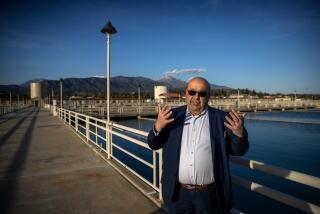Column: Another executive gets his wrist slapped for poisoning a community’s water
- Share via
The Flint, Mich., water crisis has been garnering all the headlines lately, but we shouldn’t forget its precursor in news coverage devoted to man-made environmental disasters. That would be the 2014 chemical spill into the Elk and Kanawha rivers flowing through Charleston, W.Va.
The spill of a chemical known as MCHM, which is used for washing coal and was stored haphazardly by Freedom Industries, left some 300,000 residents of nine counties without potable water for 10 days to two weeks. Somewhere between one-fifth and one-half of the affected households reported that at least one person in the family had become ill from the water, according to a survey led by Purdue University.
Hardly a criminal.
— U.S. Judge Thomas Johnston on William Tis, who was convicted of a criminal charge in his courtroom
Now the legal consequences are coming due, and on the whole, they show that corporate executives can allow disasters like this to happen with impunity.
On Monday, the Charleston Gazette-Mail reported that the fourth former executive of Freedom Industries was sentenced for his role in the spill. Federal Judge Thomas Johnston sentenced William E. Tis, a former Freedom director and co-owner, to three years’ probation and a $20,000 fine. Tis had pleaded guilty to a single misdemeanor count of causing an unlawful discharge of refuse matter. The maximum sentence was a year in prison.
Tis was the fourth Freedom executive to escape jail time under the gavel of Johnston, who pronounced him “hardly a criminal.” Johnston last week fined the company itself $900,000 but acknowledged that “there’s no way the fine will ever be paid,” since the company is bankrupt. A settlement of local claims last year illustrates the scale of the injustice: About $2.3 million exists in company assets and contributions from its offers to pay claims totaling $56 million.
Tis and his fellow executives join the parade of business leaders avoiding the full measure of punishment — or in some cases, any punishment — for their misdeeds. The absence of banking and finance executives from the roll of those prosecuted for the 2008 economic collapse has been well-marked, but they’re not alone. Typically, penalties for corporate wrongdoing fall on the executives’ corporations — which is to say, their shareholders. That simply won’t incentivize executives to do the right thing.
White-collar criminals are so seldom prosecuted, much less jailed, that it’s front-page news when an executive faces even watered-down charges. Take the case of Don Blankenship, who was the head of Massey Energy in 2010 when a blast at one of its mines took the lives of 29 coal miners. A federal jury convicted Blankenship in December on a single misdemeanor count of conspiring to violate federal mine safety standards, but cleared him on two felony counts. He’s subject to a fine of $250,000 and up to a year in prison, but he could have faced a 30-year term if found guilty of all charges. In any case, he won’t be suffering much; in 2009, before the mine blast, he pulled down compensation of $17.8 million.
To be sure, the sentencings on the West Virginia spill aren’t over: Former Freedom President Gary Southern will be sentenced next week and former CEO Dennis Farrell on Thursday. Like their compatriots, both pleaded guilty to federal charges. Southern, who faces a minimum 30 days and a maximum three years in prison and a possible fine of $300,000, became the face of corporate insensitivity after the spill was discovered when, armed with bottled water at a news conference, he complained that he had had “a long day” and asked reporters to “wrap things up.”
As part of his plea deal, he received back several assets the feds had seized, including a Bentley auto and more than $7 million in savings. Federal prosecutors also dropped charges that he had lied to them about his assets and the circumstances of Freedom’s bankruptcy.
Federal prosecutors had moved for minimum sentences for Tis and the other already-sentenced Freedom executives, arguing that they had helped with the prosecutions of their colleagues. In fact, they were all turning on one another. Former plant manager Michael Burdette, for instance, got off with probation and a $2,500 fine after fingering Tis and others, who he said knew full well that a dike designed to contain the MCHM was leaky and in desperate need of repair. Tis and the others then fingered Southern and Farrell. The latter two may have had no one higher up to finger, so perhaps they’ll be “It.”
As long as executives who are in responsible positions when avoidable disasters happen continue to get off almost scot-free, avoidable disasters will continue to happen. In Flint, a state official heading the investigation of the water crisis has said that criminal charges up to and including involuntary manslaughter could ensue. Unfortunately, the historical record says otherwise.
------------
FOR THE RECORD
Feb. 10, 2:52 p.m.: An earlier version of this article misspelled former Freedom CEO Dennis Farrell’s name as Ferrell.
------------
Keep up to date with Michael Hiltzik. Follow @hiltzikm on Twitter, see our Facebook page, or email michael.hiltzik@latimes.com.
More to Read
Inside the business of entertainment
The Wide Shot brings you news, analysis and insights on everything from streaming wars to production — and what it all means for the future.
You may occasionally receive promotional content from the Los Angeles Times.











